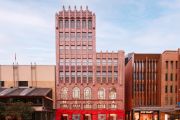
Pubs are a bloke’s world? These female hoteliers have other ideas
Women in mining? More than 40 per cent of employees at iron ore giant BHP are female. Technology? The gender pay gap persists but is falling quickly. Pubs? Well, that seems like a beer swilling, kind of rough and tumble industry where female publicans are few and far between.
According to the Australian Hotels Association, however, that’s not quite the case. In 1992, The Sydney Morning Herald reported at the time, just 7 per cent of hoteliers in NSW were women. Now, the state’s peak hotels association says, that figure is about 50 per cent.
Maureen Thornett is one of those publicans. And having worked in pubs for more than five decades, she has seen the change first hand.
First, she co-managed the North Star Hotel – now rebranded as the Rag and Famish, a classic workers pub in North Sydney – The Doncaster and The Dolphin in Surry Hills with her husband in the 1970s. When her marriage ended, Thornett went out on her own, buying up The Royal Oak in Balmain, in Sydney’s inner west.
“It was very rough and tumble in those days. The first two weeks I was here, I didn’t see another woman in the bar,” she says. Those early days, Thornett adds, were full of regret and sleepless nights.
“The boys really tested me. They put me to the test being female. They didn’t like the fact that a woman was here. They didn’t think I was running the place properly.”
Eventually, the locals warmed to her, even becoming protective if strangers turned up and said something untoward. Thornett was joined by one of her daughters, Sophie, who has worked alongside her for three decades. Not that Thornett, now in her early 80s, plans to retire anytime soon.
“I always say to myself, the day that I put the key in the door and I don’t want to walk in, that’ll tell me, but it hasn’t happened yet,” she says.
Kate MacDonald is the senior vice-president of hotels and hospitality at JLL, one of the country’s biggest commercial real estate agencies. She says the days when pubs were a dozen men sitting around a bar are long gone.
“It has been understood for some time now that perhaps the secret to a good pub is to provide an offering and an environment that attracts everyone,” MacDonald says.
“Women entering the industry marked the start of this movement and we as a society have never looked back. I have been lucky to sell a significant number of pubs for female operators – many of which had owned the assets for over 30 or 40 years.”
It is remarkable to think how difficult it was for women to enter a pub, let alone run one, only a few decades ago. In a now-famous incident, two women, Merle Thornton and Rosalie Bogner, even chained themselves to the bar at Brisbane’s Regatta Hotel in 1965, protesting a ban on service.
Pubs then were very much the domain of men (although this was far less the case in Britain). But, as MacDonald points out, attracting families, even children, can help pubs expand from just a venue to drink in.
Lyn Humphreys has seen this over the decades she has spent in pubs. The current owner of the Oatley Hotel in Sydney’s south, Humphreys spent her teenage years at the Invicta Hotel in the city’s inner suburbs, around the corner from the News Limited head office. It was a popular place for journalists and editors, heavy with smoke and drinking.

“In the old days, we used to live upstairs and that was always an exciting time as a kid,” she says. “In the lounge bar, it was all journalists and photographers, and quite often you’d get interesting celebrities coming down.”
On the back of the bathroom doors, the cartoonists would leave drawings and the journalists would write witty notes. “At the end of the year, dad would paint it all and leave what he thought were the best ones,” she says.
Her family moved on and bought the freehold of the Oatley Hotel in 1977.
In her early 30s, when the manager left, Humphreys put her hand up to take over – something her father initially scoffed at.
“He said, oh yeah, what are you going to do on a Friday, Saturday night when there’s trouble?” Humphreys says. “But that was the generation where it wasn’t expected for women to be involved in that way.”
But that comment was like “a red rag to a bull”, she says, and she has been manager ever since. In the years since Humphreys has led the charge, a lot has changed – especially the dining side of the industry.
“The dining has certainly improved from when we used to just have a pie oven on the back. There are full kitchens and fantastic hotel dining facilities now in all the different venues of all different qualities and styles,” she says.
Stephen Ferguson, chief executive of the Australian Hotels Association, says there is a “holy trinity of success” for pubs these days that includes food and being a friendly place for not just women but families.
“Ladies running those venues have been part of that change,” says Ferguson. Instead of just “being, men drinking beer, it’s now focused on those things,” he says. “Gone are the days of the ladies lounge, where there were demarcation lines between where males and females could go.”
Andrew Jolliffe, who runs HTL Property, a major pub brokerage, says there have been plenty of trailblazing women in the industry, from Doris Goddard – the actress who snapped up the Hotel Hollywood in Sydney’s inner suburbs in 1977 and turned it into one of the city’s most iconic venues – to Bettina Hemmes, whose design ideas helped turn Merivale, run by her billionaire brother Justin Hemmes, into a major hospitality empire.
“Women have in many respects curated the elegance and approachability of a disproportionately large number of best-in-class hotel operations nationally over several decades,” Jolliffe says.
For the last decade, one of the country’s oldest pubs has also been run by a woman. Kazuko Nelson remembers being daunted by the prospect of operating The Hero of Waterloo in Sydney’s historic Rocks district solo after the death of her husband, the longest licensee in the pub’s history.
Now Nelson, originally from Japan, is a fixture in the city’s pub scene, overseeing the hotel first opened in 1845 by a Scottish stonemason. Nelson, in fact, has seen a revamp of the venue.
“I just finished the cellar, and got the concrete redone because the older building didn’t have proper concrete floor,” she says. “In this location, it’s the only pub that can roll a keg into the cellar from the other side of the street.”

She, too, has noticed a change in clientele, with plenty of families and couples coming through the door.
“Women can multitask, and women emotionally understand people’s feelings,” she says of an increase in female publicans. “A special woman really understands the design, decoration and little details … you know, glasses should be shining. There’s a balance between male and female.”
Similar to many publicans, Nelson, 60, works seven days a week and does not appear to be slowing down. “I enjoy it. I’m just so happy. I am quite content. I feel a part of the pub, part of my home.”











